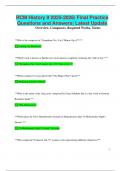Exam (elaborations)
RCM History | Final Practice Questions and Answers| Latest Update Overview, Composers, Required Works, Terms
- Course
- Institution
RCM History | Final Practice Questions and Answers| Latest Update Overview, Composers, Required Works, Terms **Who is the composer of *Symphony No. 5 in C Minor, Op. 67*?** Ludwig van Beethoven **Which work is known as Beethoven's most famous symphony, featuring the "Ode to Joy"?** *Symph...
[Show more]



